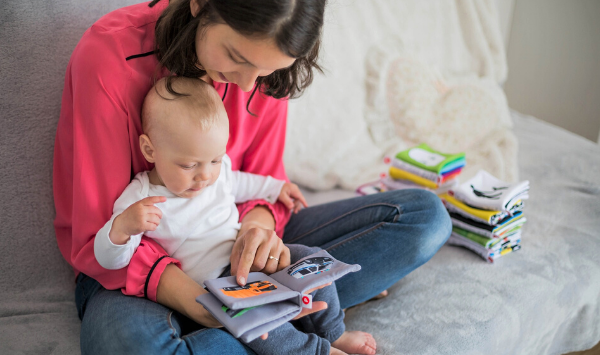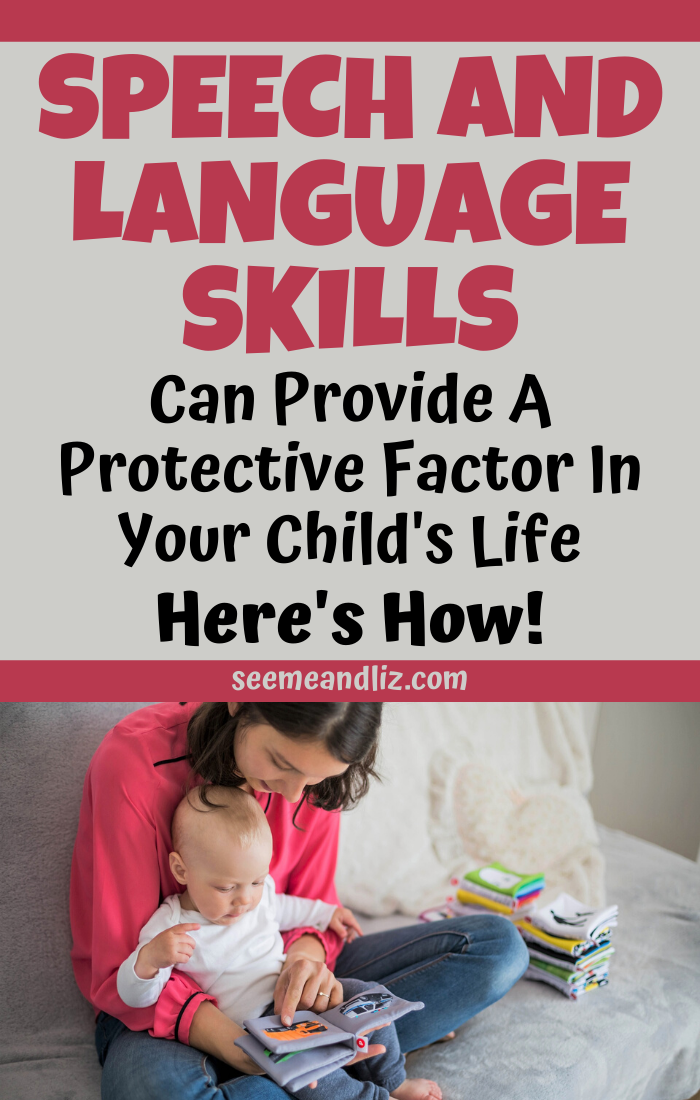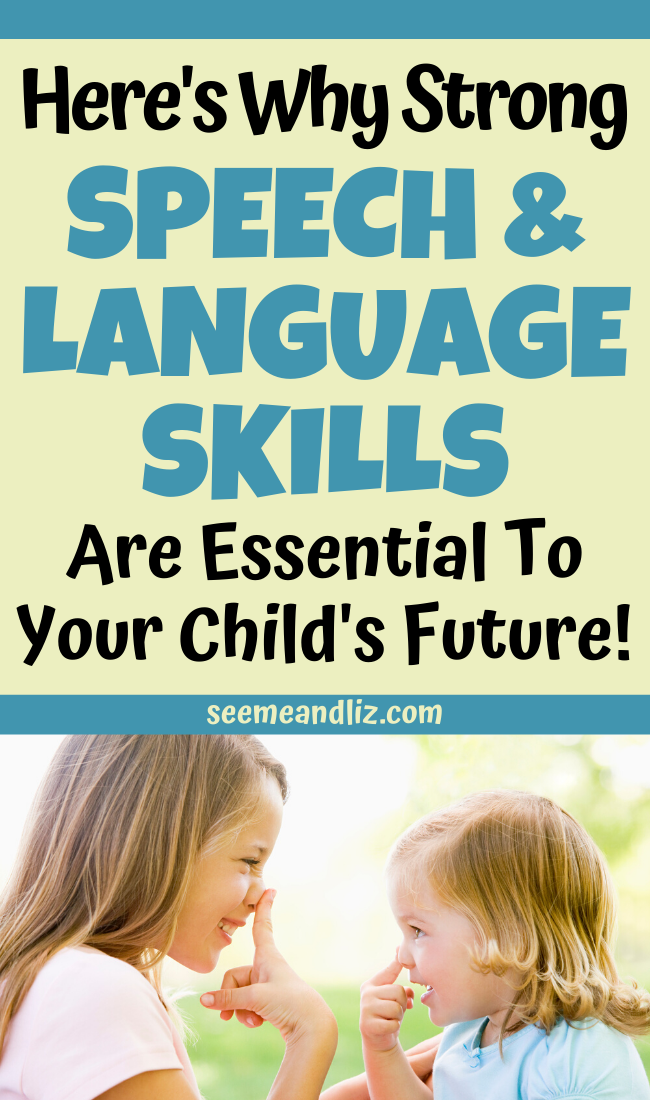
Developing speech and language skills is important for so many reasons.
Let’s start out with taking a look at its link to literacy development and then near the end of the article we will get into how having exceptional speech and language skills can provide a protective factor in your child’s life.
What is ‘Speech and Language’ and How Does it Link to Literacy?
The words ‘Speech and Language’ encompass a huge range of skills that we use every second of the day without even realizing it.
Speech and Language is being able to speak so others understand you.
It’s about being able to both talk and understand, being able to choose the right words to say what you mean, and to join them to make a sentence, tell a story and to have a conversation.
It’s also about understanding what others say to you– the words and the grammar they use, and to be able to follow instructions.
In a wider sense, communication is about how we interact with others. We use language and gestures in different ways- to express our point of view and our perspective, and to understand the perspective of others- to understand what they mean and not just what they say.
Developing these speech and language skills starts to happen even before birth!
It’s not something that has to be taught, but is learnt naturally from the people around us.
A speech and language delay or disorder can be so easily missed. It’s often referred to as an ‘invisible condition.’
Unlike language, literacy does have to be explicitly taught. It’s not a natural process but is taught through repetitive instruction over a number of years.
However, language provides the foundation for literacy. Without a strong foundation in language skills, children are unable to make the transition to literacy. This gap only widens as they move through school.
Difficulties in language and difficulties in literacy are strongly linked. Research suggests that difficulties in reading and writing are ‘simply a later manifestation of what was observed (or not observed) earlier as a disorder of spoken language development’ (Snowling and Hulme, 2011).
The Impact of Language and Literacy Difficulties
So, we know that speech and language difficulties can become a literacy deficit.
Together, these can have a massive impact on your child’s life.
Think about modern workplaces. Even in those that you wouldn’t expect to need strong language or literacy skills, there are more forms than ever to fill out, verbal and written instructions to follow, and paperwork to do.
We also have to present ourselves well- we need to be articulate in interviews, and we need to be able to build good relationships with our colleagues, managers and customers.
For someone with a language or literacy impairment, some or all of this will be incredibly difficult. Developing these speech, language and social skills is more important than ever in modern times.
Research shows
• declining employment rates among young men without higher education is now a global phenomenon.
• 88% of long-term unemployed men have speech, language and communication difficulties (Elliott, 2009).
• 60% of young people in the youth justice system have speech, language and communication needs.
There’s a huge difference between the percentage of speech-language difficulties in the general population and in youth offenders, so it could be concluded that speech-language difficulties are a key risk factor/indicator for engagement in the youth justice system.
Language difficulties might be obvious in cases with intellectual disability or ASD, but it can be a hidden disability for a huge amount of young people.
The Downward Spiral
Difficulties in developing speech and language skills have a much wider impact than we might initially think, even linking to mental health, leaving school early and youth justice!
Poor language skills can hinder a child’s ability to form friendships with their peers. They can become marginalized with low self-esteem.
Those who become isolated in this way can experience anxiety and depression which can affect their mental health. This can become exacerbated with age if unidentified and untreated.
These factors can start to affect educational achievement, social integration, and general behavior.
We’ve seen how language problems can lead to problems with reading and writing and so with these poor foundation skills the gap only continues to widen.
As school demands become more difficult it can become easier for a young person to play the clown or to skip school.
Their friendship group can become children who are similar or who see their vulnerability and take advantage by using them for the riskiest criminal activity or by using you as a scapegoat.
All of this this can increase the probability of offending behavior and early disengagement from school.
What to Look Out For
I’ve talked about Speech and Language difficulties as a ‘hidden condition‘. We can think of it like an iceberg.
Children and young people might be described by adults as a slow learner, away with the fairies, doesn’t listen, lazy, non-compliant, naughty, cheeky or withdrawn.
From what we can observe, it’s easy to label a child or young person with these traits.
But what we see may just be the tip of the iceberg.
Underneath could be significant difficulties in developing the speech and language skills that are needed for the classroom.
If a young person doesn’t understand instructions, they may use disruptive behaviors to avoid tasks or they may withdraw so their difficulties aren’t noticed.
Developing Speech and Language Skills as a Protective Factor
Developing these speech and language skills at an early age is vital to provide this protective factor in your child’s life right from the beginning!
Some practical tips include:
• Make quality conversations a priority. Focus on building your child’s vocabulary by feeding in lots of language. Comment on things that are happening around or that your child is doing. Use more comments than questions (for example, say ‘look, a dog!’ Instead of ‘what’s that?’)
• Keep in mind that time spent watching TV or on iPads displaces time that would be spent on early social interactions, play experiences, and receiving language input through conversation. These experiences are crucial for a child’s cognitive and language development. There is no sound evidence that children under 2 years old can learn from screen media. Parents who engage with mobile technology are also much less responsive to their child.
• Play, play and play some more! Play is essential for developing speech and language skills as well as social skills. Play is the best learning opportunity you can give your child. Check out the ‘Learning Through Play’ section on the site for lots more information and ideas.
• Build your Child’s Storytelling Skills – Storytelling activities for children play an important role in early literacy and language development. These narrative skills are needed for great conversations and also for literacy development. Read as much as you can with your child. Use books as a platform for great conversations. Talk about the story and practice predicting (‘uh oh what do you think will happen?’) and talk about the thoughts and feelings of the characters. Use emotional vocabulary (e.g. anxious, happy, sad, proud) and help your child to understand the different perspectives of characters.
• Build your Child’s Vocabulary– The size of your child’s vocabulary as they enter school can be used to predict their academic success later on. Make it a habit to give them the words for things. Remember to use lots of different types of words- naming words (lion, cactus, daffodil), action words (sleeping, growling, hopping), describing words (funny, happy, huge), how words (quickly, slowly, carefully, tiredly), and location words (behind, in front, in out, on).
• Build your child’s Phonological Awareness starting in the preschool years. Phonological Awareness is the ability to manipulate and play with sound patterns. Skills such as rhyming, being able to break words into syllables, and to break up and manipulate the sounds in a word are all early Phonological Awareness skills. A study by Dr Jane Carroll showed that a child’s Phonological Awareness ability at school entry can reliably predict their early literacy success. Building Phonological Awareness can be done in a fun, playful way. It’s something for parents to think about long before the first day of school.
The Importance of Speech and Language Skills Should Not Be Taken For Granted!
Developing your child’s speech and language skills from an early age will give them a protective factor in life by giving your child a foundation to develop vital skills for school and later life.
Strong speech and language skills are needed to learn to read and write effectively.
Speech, Language and Communication also plays a huge role in the development of social skills and links directly to educational achievement.
You could say that developing speech and language skills provides a platform for a higher quality of life!
If you enjoyed this post, please share or comment and do also check out some of the other child development posts here and on my website Happier With Tea.
Thanks for reading!
Freya
Author Bio
 Hi, I’m Freya- a blogger, writer, and Speech-Language Therapist. I love my job and the opportunity every day to share my knowledge and experience in this area.
Hi, I’m Freya- a blogger, writer, and Speech-Language Therapist. I love my job and the opportunity every day to share my knowledge and experience in this area.
My passion is to help other parents to be intentional in key areas such as developmental milestones, play, language development, behavior, school readiness, literacy, and educational achievement. What you do at this stage impacts your child far, far into the future- so be an Intentional Parent!
Follow me on Instagram and Twitter.






